| Reports of visits to Japan of POWs |
Friendship meeting with Japanese citizens in Tokyo
October 2, 2013
| Ms. Carolyn Archibald | Mrs. Lesley Dixon | Ms. Katharine Anne Tighe | Ms. Christine Gaye Bernie |
| Q&A | Closing remarks |
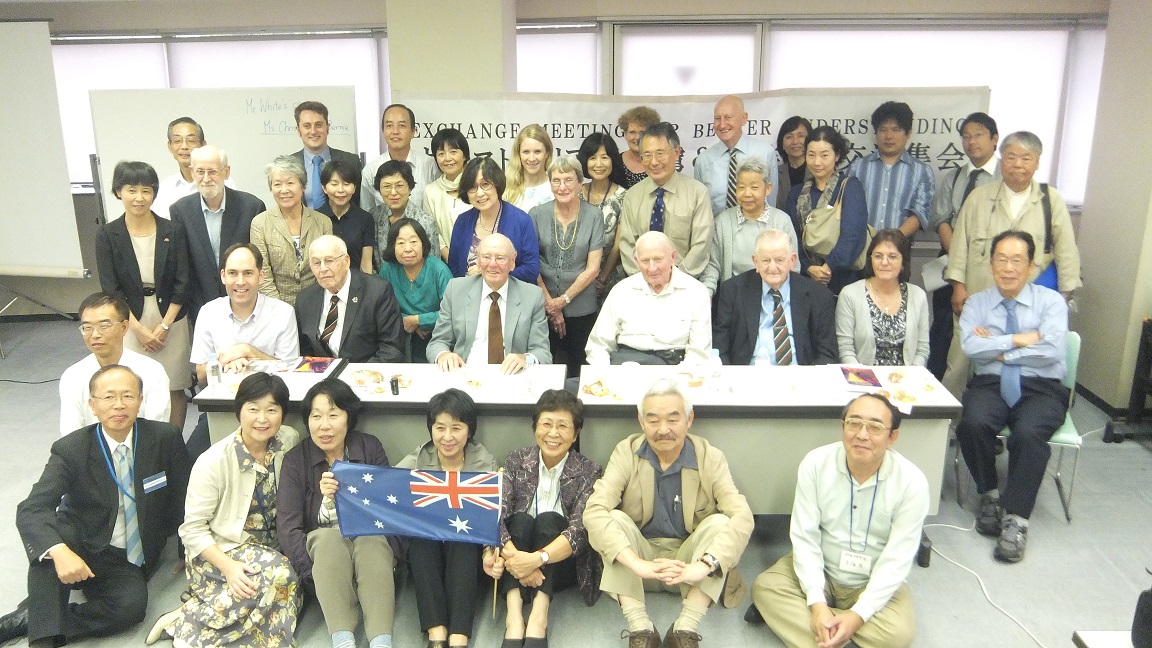 |
Date: Wednesday, October 2nd, 2013 14:00-16:30
Place: Tokyo Azadudai Seminar House in Tokyo
Organizer: Japanese Society for Friendship with ex-POWs and Families
Cooperated by: POW Research Network Japan (POWRNJ)
Chairs: Mayumi Komiya; Yoshiko Tamura
Interpreter: Harumi Kitahara
Mr. Charles Arthur Edwards |
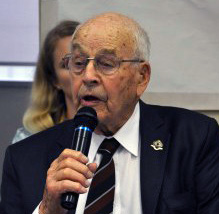 |
He became a POW Captured in Parit Sulon, Malaysia in January 1942.
He was sent to Singapore in September 1942 and interned in some camps such as Changi, Havelock Road and River Valley Road.
He was transferred to the Burma-Thailand Railway in February 1943 and was forced to labor in various camps along the railway.
After the railway was completed, he was back to Singapore in May 1944.
He left Singapore for Japan on Rashin-Maru in July 1944 and arrived at Moji in September.
He was interned in Ohama Camp (Hiroshima 9-B) where he was liberated.
*Please see the memo about Ohama Camp >>PDF
After watching that movie (about Burma-Thailand Railway) I really don`t know where to start, but I will start at Muar where we engaged the Japanese army at the battle of Muar.
The Japanese crossed the Muar River at Muar and first met the Australian 8th division. Causalities were very heavy on both sides. We took out ten of their tanks. The Japanese were masters of the encircling movement. And they had a greater fire power than we had. They had tanks and aircraft, and we didn`t. And with their overpowering fire power, they pushed us back fourteen miles (20km) to Parit Sulong.
At Parit Sulong there was a bridge across the Simpang Kiri River. The Japanese had encircled around and they held the bridge. And we Australians were now surrounded. The commander of the Australians was Lieutenant Colonel Charles Grover Wright Anderson MC (Military Cross) from World War I. And for his work at Parit Sulong. He was awarded the Victoria Cross. The highest award that can be made in the British and Australian Army.
I and ten others were sent over to the west side of the road at Parit Sulong . The Japanese held the bridge. We could not cross the bridge. So we took out the 125 severely wounded Australians and thirty Indians. Colonel Anderson and his men had no choice, but to leave them lined up alongside the public works building.
Then they forded the river higher up. Hoping that when the Japanese came later in the day they would treat them kindly. But what they did is pour petrol on them, set it on fire and burnt them alive. That was the first atrocity that I saw. On the west side of the road there were about forty men. Then a Japanese tank came through the jungle and machine-gunned us. There were eleven left alive.
We were taken prisoners there and taken up on a three-day trip to Kuala Lumpur. Then we were put in Pudu jail in Kuala Lumpur. Under indescribable conditions. There were about 600 men in an area twenty meters by twenty meters. We could hardly move.
Mr. George William "Peter" Dixon |
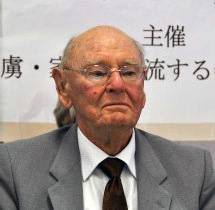 |
He became a POW in Kavien, New Ireland Island in January 1942.
He left Rabaul for Japan on Naruto-Maru in July 1942.
He was interned in Zentsuji Camp (Hiroshima 1-B), and was transferred to Hanaoka Camp (Sendai 8-B) where he was liberated.
*Please see the memo about Zentsuji Camp >>PDF
*Please see the memo about Hanaoka Camp >>PDF
Ladies and gentlemen, I am here by invitation from the Japanese to come over here. And connected it is … to have an organization in Australia. I was an honourable guest of the Japanese for three and a half years and I can`t even get that right. And I am here today not to reminisce those days. It is 70 years ago. That is a long time ago and probably only the four of us sitting here were even alive. We cannot go on harping back on a war that is over, finished and done with.
Anyway we are here now and Japan has an incredibly important role to play in the world today because you are the leading nation in the Pacific. You are the equivalent of what England was in the Western World. We must look towards Japan to carry out its obligations in the Far East. We, in Australia, are a major place that you sell things to. We also buy a vast amount of equipment out of Japan.
There is a dangerous period staring us in the face. Some of you may remember that after the war that one of your aims of being in the war was to develop, what you termed the Greater Far Southeast Asia Prosperity and now you have to perform. As I say the past is the past. I have to stop again, don`t I?
To bring things into perspective those sitting here we drove down from the airport down in Tokyo. Now on that trip from there we drove through an area that contained about 75% of the total amount of the population of Australia.
I came from, well retired, from Queensland Australia. Now all that you people would ever know about Queensland in Australia is Brisbane, the Coral reef, and anything on the seaboard. There is dividing range that runs along the east coast about 30km inland. That is where Queensland starts. I have run out of time. Thank you, ladies and gentlemen.
Mr. Adye Glen Rockliff |
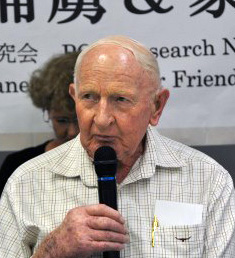 |
He became a POW in Java in March 1942.3 and was interned in Java No.1 Branch Camp in Bandung in August 1942.
He was transferred to Java Main Camp in Batavia in November 1942. He was sent to the Burma-Thailand Railway in January 1943 and was forced to labor in various camps along the Railway.
After the railway was completed, he was back to Singapore in May 1944.
He left Singapore for Japan on Rashin-Maru in July 1944 and arrived at Moji in September.
He was interned in Ohama Camp (Hiroshima 9-B) where he was liberated.
*Please see the memo about Ohama Camp >>PDF
Thank you. I served on the Railway in Thailand for eighteen months. Malnutrition was the main contributor. Every death, every sickness, every illness and every amputation in some was contributed by malnutrition. Of the Australians who worked in Thailand 38% died. This was the lowest fatality rate of any nationality group involved. The total number of deaths on the railway for men, women and children was 115,000. Malnutrition did a lot of damage both physical and mental.
And three months into this period the first damage done by malnutrition came apparent. This was evident in the loss of balance in coordination. At six months 4% has lost their vision. At the same time we developed what we called "happy feet." This was caused by the damage to the nerve endings and extremities. Any damage caused by malnutrition is still with us. I have still have "happy feet." We had brain damage and I still have no short-term memory. And I still have a loss of balance in coordination. 90% of those who were prisoners developed arthritis in later life.
During the post-war period the death rate has been quick. That is about enough. I would like some questions.
Mr. Alexander White |
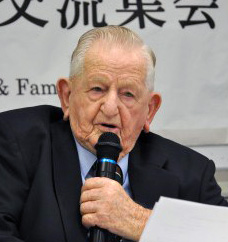 |
He became a POW Captured in Singapore in February 1942 and moved from one camp to another such as Changi, Bukit Timah, Adam Park and Lawn(?) Road.
He was transferred to the Burma-Thailand Railway in March 1943 and was forced to labor in various camps along the railway such as Tarsau, Tampi, and Tonchan. After the railway was completed he was back to Tamarkan and was taken to hospital in Nakhon Pathon.
He left the hospital in April 1945 and transferred from Ban Pong to Prachab Kirikan. After working in Mergui Road, he returned to Nakhon Pathon where he was liberated.
(This manuscript was sent to us from Mr. White after the meeting)
We left Nakhon Pathon in April 1945 & walked to railway station to embark on a trip to Hell in open rail wagons the steel floor for a bed. The trip to Prachuap Kiri Khan was roasting hot during the day & very cold at night. We only stopped for cooks to half cook the rice then off again. I'm not sure how long the trip took arriving at Prachuap Kiri Khan we walked to a camp at the edge of the jungle where we collected our tools & other supplies. Next day we set off for the road camp after several days. Sleeping when we stopped at night on the ground wet cold & hungry eventually arriving at the camp some of the road had been formed it was a sea of mud we had to walk through this. The camp was on the side of the hill below the road bamboo floor & bamboo roof which was useless once the sun buckled it the rain came straight through. Getting to work was hard work the hill was steep & slippery mud the road was the same, working the usual long hours.
I can't remember how many days or weeks I worked before the malaria finally turned to Black Water Fever as we had no quinine. I was unconscious for about 10 days, the English Mo Cpt. Calcy saved my life by mixing Atabrin tablets with boiled water & injecting into my vein he had 7 tablets so one injection a day for 7 days. When eventually came too I couldn't even lift my arms, I was so weak the Dr used to feed me with leftover food from the Japs, although he used to get slapped around each time he asked for it he certainly saved my life. When the orderlies did get me up my legs wouldn't work so they moved them for me after a few days I was able to move them myself & by holding on to the hut walk by myself but I was very weak. About this time the Japs decided to send a party of sick back to Nakhon Pathon. This party consisted of 100 sick & 40 so called fit men. I was carried down to a camp where the trucks could get to. I was carried by 4 UBT CHAPS one I remember was Bill Sanderson [boong] a good mate of mine, how they managed to get me there through the mud & not drop me I don't know. The next day at this camp I managed to get to the creek to have a wash, the Thais were stunning the fish up stream one floated down near me I managed to catch it I got it up the bank to where an ossie had a fire going he cooked it so we both had a good feed. The next day the trucks took us to a camp near Prachuap Kiri Khan we had tents to sleep in & plenty to eat as the Japs here thought all the workers was coming out. So plenty of veg & pigs for 140 of us. The cooks said the more we help the more we can cook so we helped & ate like little pigs for about 2 weeks. When we went to the railway to catch the train some of us weigh ourselves, I weighed under 6 stone & was feeling good. The trip back was the same old rail trucks same half cooked rice. But I had a jar of pig fat & a mate had a jar of sugar which we mixed with our rice that made it better. The others in the wagon wouldn't try it. Eventually we stopped at a village where the british had bombed the bridge so we left the train to walk about 2 miles to a camp to wait for another train. I carried my gear over & went back with others to help other sicker chaps, two of us were helping an artillery chap who [should have been on a stretcher] to walk getting him out on to the road he sat down we gave him a drink of water then he died. The Japs eventually sent a party with a stretcher to carry the body the camp. I didn't know his name.
Arriving back at Nakhon Pathon we walked to the camp & sat in the shade of a mango tree [totally buggered] an old mate Ken Sweet came out of a hut & went back into the hut & said there was no one he knew out there & we had trained together & were mates all through the line job??
Once we were settled into a hut we were inspected by Mo Major Fisher coming to me he said to the orderly Blackwater Fever, put him on liver & 2 blood transfusions the liver was 7 injections not the editable type that I thought. The blood came from two English cooks who received 10 eggs each which they cooked for me. 1 fried egg on rice bread each morning I thought it was Christmas. After a few weeks they put some of us into another hut to do PE to get fit for more work but after 2 weeks the war ended so I was pretty fit & volunteered to guard the Japs. There was 100 aussies & 100 Dutch. We went on duty 12 pm till 12 midday. We were there when Lady Mountbatton came she was there about a week then went to Singapore.
Didn't arrive back to Aussie till November on the Circassia a Scotch crew, we had a great time on board even drank a bottle of scotch when we entered the heads. So ends that episode of life on The Mergui Road.
Ms. Carolyn Archibald |
 |
I never thought that I would go on a trip like this. I should say that my grandfather has never shown any prejudice towards the Japanese people as I grew up. Despite everything that he experienced he has always shown great discipline and humility. They say that every cloud has a silver lining, so I think there is measure of thanks for the discipline that he learnt. We are very proud of him.
And I would like to say, "Arigato gozaimasu" for listening and learning. And, of course, as a young Australian I am proud to have a strong relationship with the Japanese people.
Mrs. Lesley Dixon |
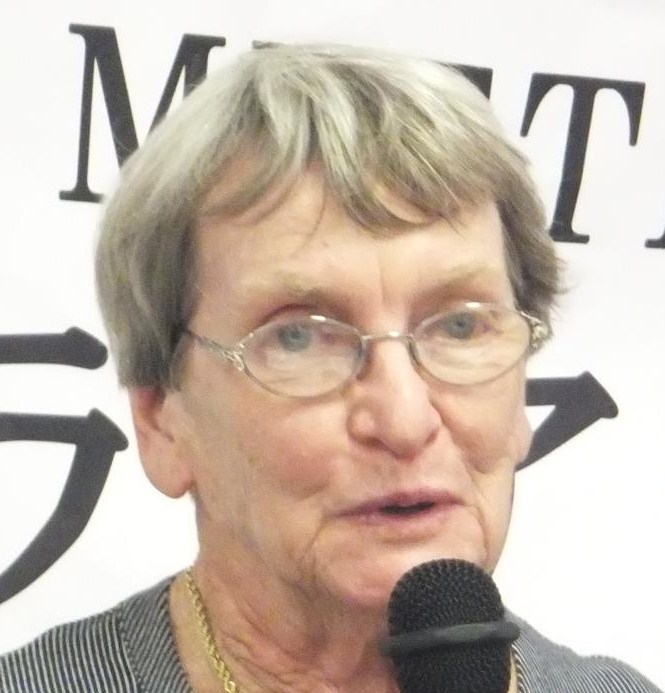 |
Good afternoon. It has been wonderful to live a life with Peter for the past 45 years. He has never shown any bitterness, carried any grudges, whatsoever against the Japanese people. He left everything of the bad side of it. He left it in the prisoner of war camps. Came back to Australia, got himself fit as he said. Everybody else was thin, but he wasn`t. There were no mirrors. You did not know how thin you were, but he came back and as I said got fit, and carried on with a career in construction and ended up, we have traveled to many countries in the world. And he has always had a positive attitude.
And three months into this period the first damage done by malnutrition came apparent. This was evident in the loss of balance in coordination. At six months 4% has lost their vision. At the same time we developed what we called "happy feet." This was caused by the damage to the nerve endings and extremities. Any damage caused by malnutrition is still with us. I have still have "happy feet." We had brain damage and I still have no short-term memory. And I still have a loss of balance in coordination. 90% of those who were prisoners developed arthritis in later life.
During the post-war period the death rate has been quick. That is about enough. I would like some questions.
Ms. Katharine Anne Tighe |
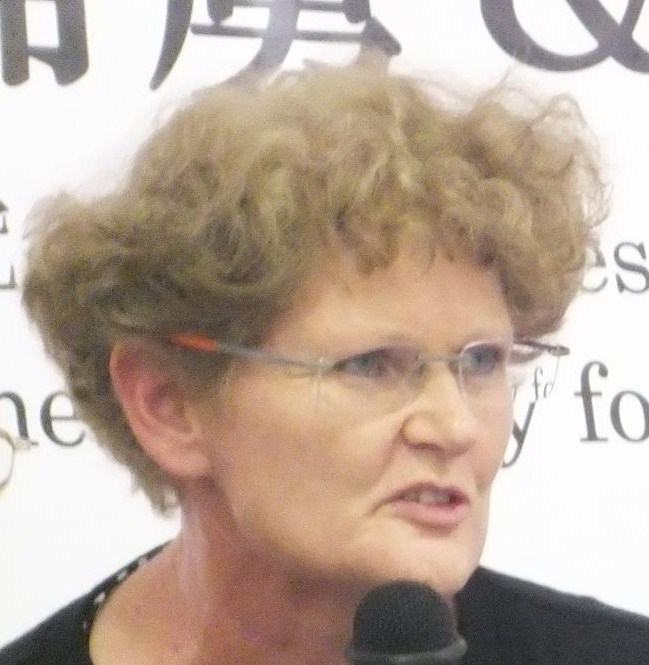 |
I think when my father came home from the war he put it all behind him and got on with life, bought a farm, got married and had children within a few short years and we really didn`t realize much about his life in the war as a prisoner as we were growing up. His life as a farmer was probably harder because of the physical damage he suffered.
He also went off every year and had a reunion with the men that he had been a prisoner of war with. That was a time when they remembered the men that were lost, but also celebrated their survival and their on-growing friendship. And they still do that the last few of them now.
For a lot of years I think my father was rather bitter about his war experiences and really could not talk about Japan. He eventually relented and bought a Japanese car and we have been Japanese ever since. We are very pleased with our current car. I think that this trip is wonderful because it gives him a chance to overlay those memories of Japan with something else and to acknowledge that we have moved on and the world is a different place. Thank you very much.
Ms. Christine Gaye Bernie |
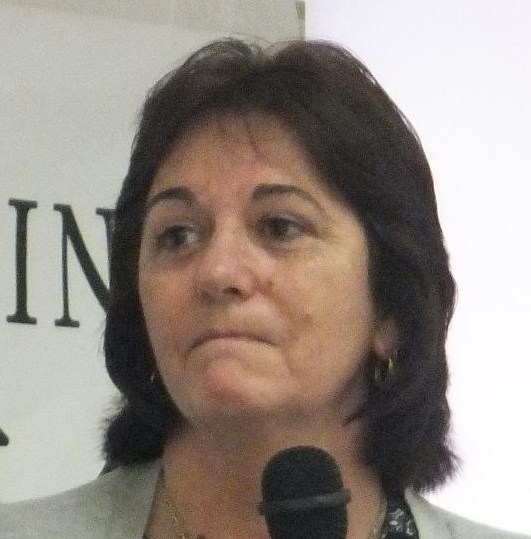 |
Sorry, there are no speeches made on my behalf. Due to the fact that my father Alex White who I will call him today is my adopted father, so therefore in the early stages of my life I did not know the experiences that he went through. It is not until recently with the reunions and also public knowledge and this sort of venture.
We can think along and realize the suffering that they went through and we are glad to see at their age that they can publicly talk and forget. Not forget everything, but to forget the hardship, but always remember the friendships.
I just hope that the next generations will never to go through what this generation went through. Thank you.
Q&A
Q: To Mr. Edwards – Did you witness the Parit Sulong Massacre?
A (Edwards): The Japanese were masters of the encircling movement and held the bridge over the Simpang Kiri river. We were surrounded. We had 125 severely wounded Australians and 30 severely wounded Indians. We lined them up against the public works building hoping that when the Japanese came later in the day, and the able-bodied went up the river and forded the river.
The able bodied who were not wounded crossed the river. When the Japanese came later in the day instead of looking after them they poured petrol over them and burned them alive.
Three men escaped. One was a sergeant in the anti-tank regiment. I can`t remember his name. One of the other two was Lieutenant Ben Hackney of the Second 29th Battalion.
And the other was Private Reg Warden.
They and I were taken behind the lines to Kuala Lumpur and put in Pudu jail. That is where I met Lieutenant Hackney. So, is that all for the question. I did not see it happen. I was on the west side of the road about I suppose about 40 meters away. There we were we machine-gunned by a Japanese tank.
Q: To Mr. Dixon: Did you see any Chinese in Hanaoka Mine?
A (Dixon): We were told that there were a few Chinese, but you must remember that we had difficulty identifying between a Chinaman from one of your own people, but the mines were mainly operated or … underground. We had a lot of women. I think they were Japanese women, but they worked there because it was pretty poor then.
Q: Should the Emperor have been executed?
A: No. (Why not?) If England had been invaded by the Germans they might have killed the Prime Minister. They would not kill the Monarch. It would have never entered anyone`s head, I think.
A (Edwards): And from me, another no because I am told Hirohito was really against warfare. It was only really the Japanese High Command that insisted on warfare. So, definitely another no.
Q: What do you think that Australia participated in other wars?
A: The wars that we fought in the Koreas, other wars, minor wars, were never of the magnitude of what world war were about. World war was a gigantic thing when thousands and thousands of people died. Both civilians and people from different services. Since World War II there has not been anything of that scale. And I just hate to think that we just carry on, carry on, carry on fighting at war that is gone finish.
Q: What did you think about the atomic bomb? Were you aware the atomic bomb was going to be dropped?
A (Edwards): We knew absolutely nothing about the atomic bomb, but I was in Ohama Dai kyu ban kaisho(No.9 Branch Camp). I was the second baker. Japan had ran out of flour and I was demoted to be a cook. I was the sub-cook on the night shift. I worked from when Germany surrendered in May until the finish. We had to cook a meal for 400 men and have it ready at 08:30 hrs. Nothing about it, but I did see one morning at 08:15hrs plus 17 seconds on the 6th of August, 1945. We were working in the kitchen and the most beautiful white light came in both doors. It made the rice cook`s body float up his body formed a silver halo. My first thought was that we were died. We have had a direct hit. But we saw this light. The light faded and we were still alive. We looked out the door and we were hit by a wave of hot air. We looked away to the east and just rising above the horizon was a mushroom-shaped cloud. The camp commandant ordered no more work in the mine.
*Note: Ohama POW camp, where Mr. Edwards was interned, was located about 130 kilometers from Hiroshima City. According to our research, there were no people in Ohama who watched the flash nor mushroom cloud by atomic bombing.
Friends of mine who were in Hiroshima when that came over, the atomic bomb was dropped with parachutes. And the Australians that he was with and nationalities (?) raced inside and said, "They are dropping food supplies." And they stood there and watched it come down. There was no knowledge prior to that.
*Note: There was not any POW camp in Hiroshima City. But there was a POW camp in Nagasaki. It was located about 1.7 kilometers from
Q: Were there any Japanese whom you could trust?
A: All we know about the war being over. We knew that the war was over before they told us because we had a secret radio in the camp.
A: Not at all. Not at all.
A: No, you were talking about the end of the war. I would like to tell you how we found out about the end of the war. We were going to work this morning and there was an old Japanese chap sitting on the side of the road. Now you will have to excuse my Japanese, but jokingly we would say to him every morning we passed him, "Senso wari chotte matte." And he replied, "Sukoshi matte nai." We said, "How do you know?" And he said that he had read a paper. So we offered him I think some cigarettes that were stolen and asked if he could give us a paper when we came off shift. He gave us the paper and there were big headlines on it. We had two of our prisoners that spoke a little Japanese. We had all our dictionaries had been taken from us. And another chap and myself went at night and stole two back. They translated that and they came down at about 6 o`clock in the morning. They said we think it is true that the war is over. And that is how we, when we walked on to parade to be taken to work the senior officer we had was Australian walked out and said to the Japanese camp commandant, "Give me your sword." There was a deathly hush. And the Japanese officer handed over his sword. And that was the end of the war.
Q: American ex-POWs seem to be still angry at Japanese. Why is the Australian attitude so different from the Americans?
A: Because they are Yanks. (laugh)
A (Edwards): I think the reason why the Americans were so sore was that the Japanese bombed Pearl Harbour on the 7th and declared war on the next day, the 8th. And the Americans were very, very sore about that.
Q: I heard that Myanmar and Thailand governments agreed to rebuild the Burma – Thailand Railway – what do you think about this agreement?
A (Edwards): I don`t think it would pay to build a railway in today`s financial situation, (it) would not be possible. And I also think that the shipping companies were against it because it would be transported from the capital Rangoon to, they have another name for it now, to the east coast of south-east Asia. It would not be possible to rebuild it.
Closing remarks |
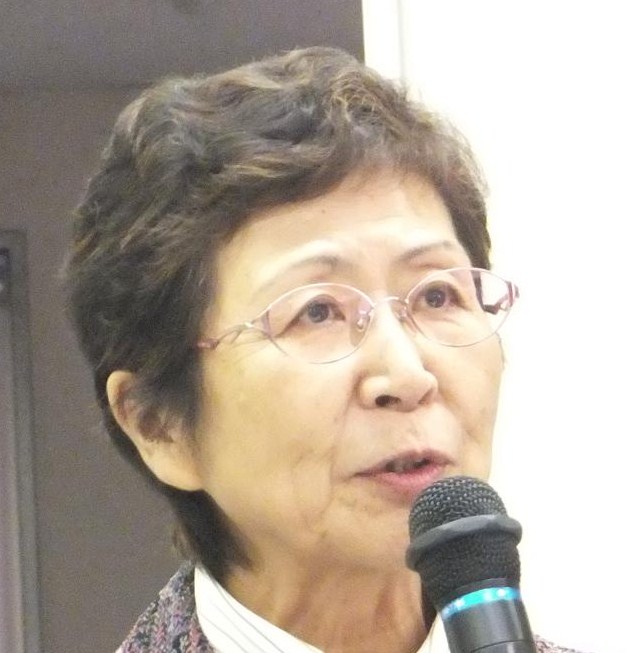 |
I would like to express my sincere appreciation for your having come all the way over from Australia. It must have been a long way for you.
I was told that some Australians' experience as POWs during the war was an important factor when studying Australia as a nation. It is often said that after the war, in the process of developing the country, their common experience as POWs was the nucleus to carry out the project. Concretely, I can safely say that, as you all know, Dr. Dunlop, Mr. Tom Uren, Mr. Hugh Clark and others, who actively worked with their experience as POWs, have been held in high esteem by the Australian people.
Just a while ago, someone asked, "Former American POWs are still mad at Japan, why not the former Australian POWs?" Let me tell you my own experience. Some 30 to 40 years ago, I remember I felt many a time the very cold eyes in Australia, from those who had been POWs. I had little or no knowledge about the POW issue in those days, though.
For the Japanese soldiers, to be a POW was a matter of vital importance. Many soldiers were taught not to stay alive in captivity. There were various kinds of soldiers of course, but many of them were taught so.
One more thing. Someone talked about what had happened at Parit Sulong. The POW issue was very closely connected to the post-war war criminal trials. There were many former Japanese soldiers who had been involved in POWs during the war, and were executed as war criminals, which made the study of the POW issue extremely difficult in Japan. However, we, the members of the POW Research Network, have organized a circle and been researching and studying on this issue for the past more than ten years.
We are happy to mention that younger generation of Australia are participating in this meeting today. From the Japanese side, young people of our members are also attending here as well. The hand-outs we have distributed to you are prepared by Ms. Sasamoto and others, who are also our members.
I believe the POW issue is a difficult and delicate matter to deal with. It is, therefore, necessary to discuss it in such meetings, and continue to talk about it and promote the mutual understanding between the peoples concerned. We would like to continue to carry out such activities in the future.
For this reason, I would like to thank you once again for having come all the way over from Australia after spending 8 hours in flight, and my special thanks go to those who testified to their wartime experiences to the audience.
Today, we have had many sharp and significant questions from the audience. We would study and research those matters pointed out, and make them available to the subsequent meetings. Thank you once again to all of you.